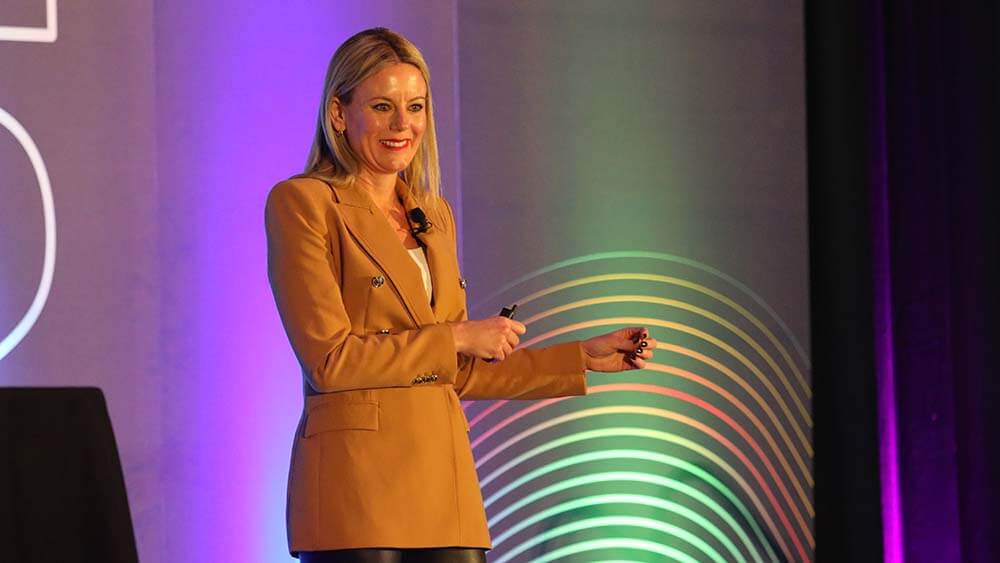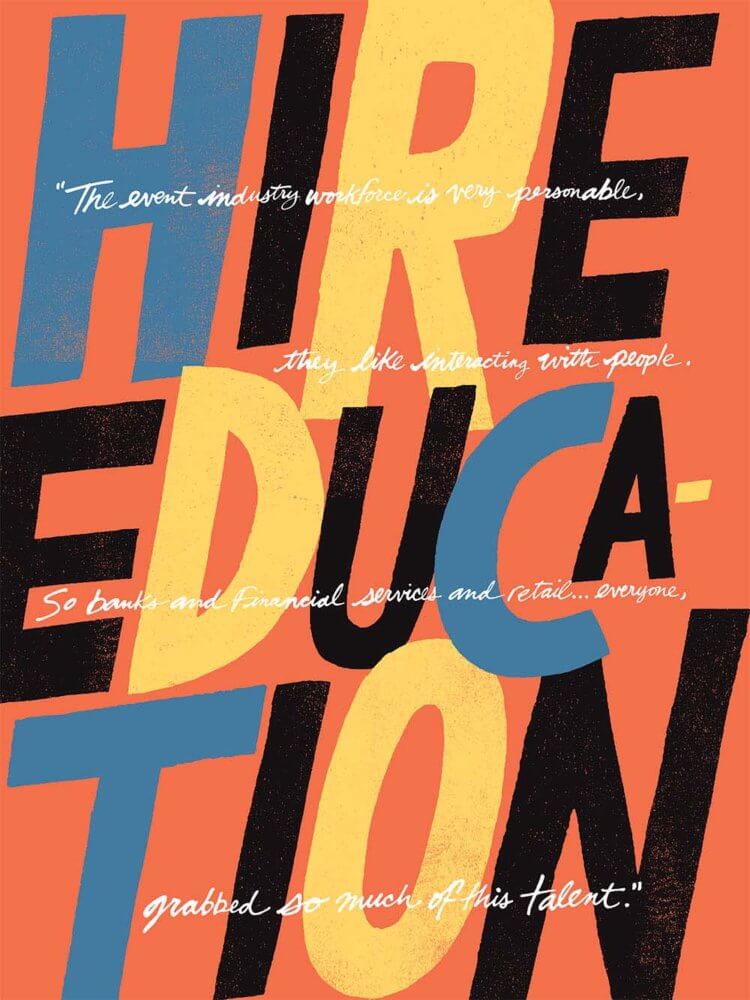
Soundings owner Tracy Judge leads at session at Convening Leaders 2022 called “Training for the events & Roles of Tomorrow: How to Build Must-Have Skillsets.” (Jacob Slaton Photography)
In 2018, Tracy Judge swapped event management for entrepreneurship and launched Soundings, a marketplace of more than 1,600 freelance workers specializing in meetings, events, hospitality, and nonprofits/associations. From both sides of the equation, the platform feels like a win-win — those who prefer to work independently gain community, stability, and perks while organizations get access to a supply of workers with well-matched skills at a time when the talent crisis has reached a fever pitch.
When the pandemic hit, Judge expanded on her business model, adding health, 401k, and other benefits along with employee status (in name only) to give independent talent the flexibility to craft their ideal workload without sacrificing the perks and support typically only available to full-time employees. And as time went on, Judge noticed a pickup in certain segments. Planners make up 5 percent of workers who joined Soundings’ Thrive Talent community within the last six months, a 40-percent increase over the second half of last year. Currently, nearly two out of 10 in the Soundings’ Thrive Talent community are freelance meeting and event planners. “We’re starting to see more planners quitting their jobs and wanting to make a change,” she said, adding that she expects to see even more take that path since burnout has become an issue.
A planner’s job has become “a lot harder,” Judge said. Because of this talent crisis, “hotels aren’t staffed, DMCs aren’t staffed. We’re still dealing with adding on the virtual/hybrid component to events. Things are coming back so fast at a time when we don’t have the infrastructure to support it, and there’s so much pressure internally to put on this awesome event.”
By 2021, Soundings’ revenue had quadrupled, and from 2020 to 2022, the Soundings Thrive Talent Community had grown by 380 percent, proving that perhaps it’s time to, as Judge says, “think about talent differently.” We asked Judge to expound on the Soundings’ model and share what makes freelance life worth considering.
Why did you start Soundings?
I say I grew up at Maritz in this industry — I did all the roles. When I went to a different agency, I got into the freelance economy and I realized that there was white space in the events business for freelancing. And we’ve always leveraged freelancers [as an industry], but it was really behind the scenes, and I saw an opportunity to bring freelancers to the forefront and make it a career path.
Why do you think some professionals in the events industry prefer the freelance route?
Freelancing gives you the ability to do the piece of it that you actually like, where your genius zone is and where your strengths align, and not have to do a lot of the stuff you don’t like to do. That also adds a lot of value for the company, because if you can piece together a couple of people for one role, where everyone is operating and leveraging their strengths, they’re going to be happier and more productive.
What trends are you seeing in terms of what kind of talent organizations are coming to you for?
There are different roles and skillsets that they’re looking for, for sure. A lot ask for CVENT [experience], technical expertise for virtual events, technical expertise on the production side, planners who have a marketing background because marketing and events have really merged at this point, and anything from a digital-marketing perspective or a data perspective.
As far as the organizations that come to you to hire talent, what are the most challenging roles to fill right now?
The hardest roles are the coordinator-like positions, like registration managers, and entry-level roles. Because [the industry wasn’t hiring them] for a few years, and then additionally, a lot of those roles were the first to get laid off. So, we have this gap of, like, five years’ experience in our industry right now, because of that.
But younger talent — they want this flexibility and they want this freedom. So, the ability for us to hire on younger talent in these roles — they need to be employees but still be able to give them flexibility — and then give our customers the flexibility of giving someone 20 hours a week, is helping the whole ecosystem.
Of the meeting and event planners who have joined your freelance pool, how are they doing in terms of pay compared to their previous full-time roles?
Most who we work with are doing better. At the end of last year, one of our freelancers sent an email to my team and said this was the best year that she’s ever had financially in her career — and that was during a pandemic.
In January 2022, you began offering full-time benefits to your pool of freelancers. What does that look like and what prompted you to supply them?
We now can provide benefits for them as if they work 30 hours a week — health benefits and other benefits as well. When AB 5* passed in California… I started looking at what was happening, not only in our country but worldwide, and saw that these laws are going to restrict freelancers. So, how do we solve this so that independents can stay independent, and also protect our customers and make sure that they’re compliant?
We have started to use the classification “independent talent” instead of “freelancer.” Our relationship with talent is the same whether they are paid as a 1099 or W2, it is simply semantics in how they are paid and the benefits they can receive. The ability for us to pay talent as a W2 allows us to place any type of role with talent from any state, ensuring employee classification compliance for our customers and creating more job opportunities for our talent community. For a lot of roles it’s not legal to freelance them [out] in a lot of states. [This way], we can make sure that our companies stay compliant and that our freelancers aren’t restricted from the work that they can get.
How did your freelancer pool respond to this change?
It was a huge shift for us and a big decision to make. We’re still working a lot of it out, but the thing that I was most concerned about was, are the freelancers going to be up in arms about it? I would say about 95 percent of people were like, “This is great, I was really sick of dealing with the taxes and trying to figure that out.” It made them feel more secure — they have that security, but they also have the freedom.
* Editor’s note: California’s Assembly Bill 5, or AB 5, enacted in 2019, changed the guidelines employers use to classify workers as employees or independent contractors (IC), resulting in many freelancers losing their IC status and the ability to run their own businesses.
Jennifer N. Dienst is senior editor at Convene.
Hire Education — Read the Series

Convene’s August CMP Series cover package examines the talent challenge the events industry is facing. Below are links to all the stories in the package.
- Is the Talent Challenge Choking the Business Events Industry’s Recovery?
- How One Association is Restaffing its Events Team
- Stopping the ‘War on Talent’
- ‘Everybody Is Having a Difficult Time Attracting Talent’
- Expanding the Events Industry Talent Pipeline
- The New Events Staffing Landscape is ‘Unsustainable’
